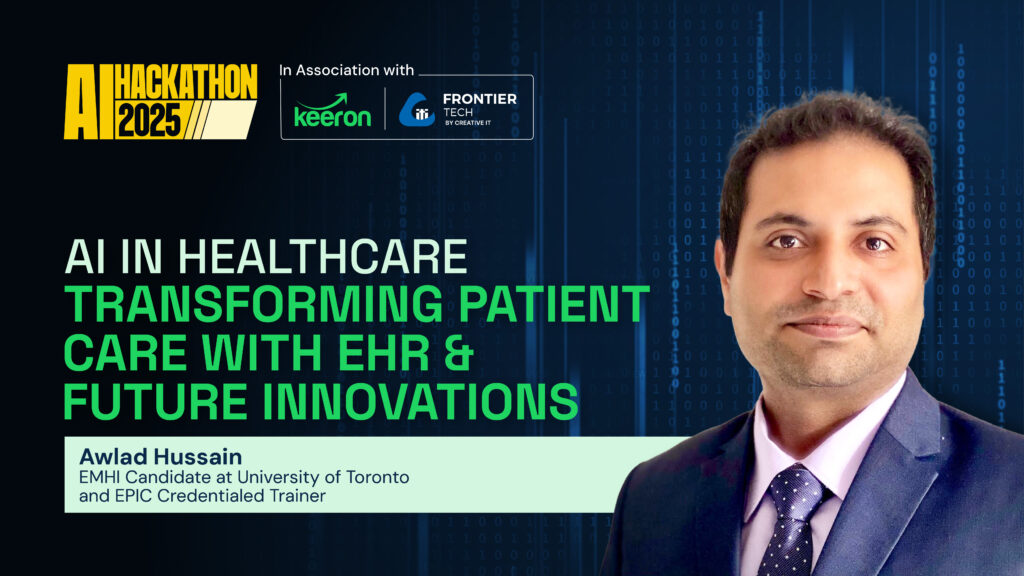As part of the AI Hackathon 2025, a dynamic platform designed to inspire real-world problem-solving using artificial intelligence, a series of knowledge-sharing sessions were organized to guide participants with insights from leading professionals across diverse sectors. These sessions aimed to spark innovation by grounding ideas in practical, context-rich knowledge.
One of the most enlightening sessions of the series was led by Dr. Awlad Hussain, a physician and health informatics expert whose career spans continents and disciplines. Dr. Hussain completed his MBBS from Sylhet MAG Osmani Medical College and later pursued a Master’s in Public Health (MPH) from BRAC University. His journey took him to Canada, where he transitioned into digital healthcare, earning advanced certifications in Health Informatics from Toronto Metropolitan University and the University of Toronto. Currently, he works with major hospital networks such as Unity Health and the University Health Network (UHN) in Toronto as a credentialed Epic trainer.
His session, titled “AI in Healthcare: Transforming Patient Care with EHR and Future Innovations,” unpacked the transformative potential of EHR systems and how AI is reshaping the delivery of healthcare—both globally and with strong relevance for Bangladesh.
Understanding Epic: A Global Force in Digital Health
Dr. Hussain began by introducing Epic, one of the most widely used Electronic Health Record (EHR) systems in the world. From humble beginnings in a basement in the U.S., Epic has grown into a billion-dollar company, now operating in thousands of hospitals across North America, Europe, the Middle East, and Australia.
Epic enables doctors to view a patient’s complete medical history, order tests, view lab results, and interact with imaging and medical devices, all in a single integrated system. What sets it apart is its decision support capability: if a doctor prescribes a medicine that the patient is allergic to, Epic will immediately issue a warning, reducing the likelihood of critical errors.
Real-Time Collaboration in Healthcare
A highlight of the session was Epic’s capacity to promote seamless collaboration. If a patient from Canada is hospitalized in the U.S., their health records can be accessed in real time, no need to redo tests or chase old reports. During the COVID-19 pandemic, this interoperability helped monitor ICU bed availability in real time, playing a crucial role in hospital resource management.
Where Bangladesh Stands: Slowly Going Digital
Dr. Hussain then shifted the focus to Bangladesh, where most hospitals still rely on paper-based systems. However, he noted that the winds of change have started to blow. Some healthcare institutions in Dhaka and surrounding areas have begun implementing digital health records. The benefits are immediate: no more deciphering illegible handwriting, no missing files, and no time lost searching for patient history.
Enhancing EHRs with AI
Layering AI on top of EHR systems unlocks a new level of efficiency and care. AI can monitor vital signs and automatically alert clinicians if a patient’s condition is deteriorating. It can also assist in diagnosis, especially in time-critical scenarios.
Dr. Hussain explained how machine learning and natural language processing (NLP) are making healthcare smarter. AI tools can summarize doctor-patient conversations into notes, saving time and improving documentation accuracy. In real-world applications, hospitals using AI-integrated EHRs have seen up to 30% fewer readmissions, thanks to predictive alerts that warn clinicians of potential health declines before they become critical.
Personalized Medicine and Wearable Health
Another emerging area is personalized medicine, where treatment is tailored to a person’s genetics, health history, and lifestyle. Dr. Hussain shared his experience working on Canada’s readiness for personalized medicine. Wearable devices, such as smartwatches, are already collecting valuable health data that feeds into this model.
In radiology, AI has significantly boosted performance, improving cancer detection by 20–30% while also reducing false positives. These advancements not only help patients but also support doctors in making faster, more accurate decisions.
Roadblocks to Innovation
No discussion of innovation is complete without acknowledging its challenges. Dr. Hussain identified four key barriers:
- Interoperability – Many hospitals use different EHR systems that don’t communicate well with each other, making data-sharing a hurdle.
- AI Bias – Models trained on foreign data may not yield accurate outcomes for Bangladeshi patients. Localization is key.
- Privacy – Unlike countries with strong data protection laws like HIPAA (U.S.), PHIPA (Canada), or GDPR (EU), Bangladesh currently lacks robust patient data laws.
- Cost – Setting up AI-backed systems and training staff requires significant investment, which many hospitals may struggle to afford.
The Way Forward: Standards, Training, and Local Innovation
To overcome these hurdles, Dr. Hussain emphasized the need to adopt international data-sharing standards like FHIR and HL7, which help different systems talk to one another. He also underlined the importance of strong privacy laws and using local data to train AI systems to ensure cultural and clinical relevance.
Training is another crucial element. “I’ve worked in training for years,” he shared, “and I’ve seen how it dramatically improves system adoption and reduces errors.”
A Final Thought: Think Big, Start Small
Dr. Hussain closed the session by encouraging participants to identify real healthcare problems in Bangladesh and consider how AI could offer solutions. His advice was clear and grounded: “Think big, but start small.” He reminded participants that transformational ideas often begin with solving specific, local issues.
The session was not just a technical overview; it was a call to action for healthcare practitioners, data scientists, and innovators alike to co-create a healthcare system that is smarter, safer, and more responsive to patient needs.

